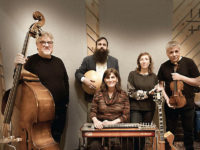feature photo: Chris Weiss
Nate Wooley is a fearless trumpeter whose past works include dauntless experiments with electronics and tape manipulations, encounters with jazz outlaws Joe Morris and Ivo Perelman and a creative reinvention from Wynton Marsalis’ pre-curator days ((Dance to) The Early Music). Wooley’s latest invention is inspired not by another artist or by sound manipulation, however; it comes from a place.
Columbia Icefield refers to the large area of connected glaciers found along the Canadian Rockies continental divide that separates British Columbia and Alberta. Not far from Wooley’s Pacific Northwest childhood environs, the sheer size of this alien looking field is a apt metaphor for man’s relation to its environs, a catalyst that informs Wooley’s music set to three, long form compositions.
Wooley had assembled an electric band to carry out his mission, but perhaps not quite the electrification you might first think of. Sure, there’s an electric guitarist, but that comes courtesy of Mary Halvorson, who is one of the least conventional players of that instrument. There’s also a pedal steel guitar, provided by Susan Alcorn, who is also a maverick of her chosen instruments. And Wooley himself is playing his trumpet hooked up to an amplifier. Ryan Sawyer completes the quartet on drums.
“Lionel Trilling” begins with some pieces of the puzzle missing, but as the layers are piled on and pushes forward, a form emerges. What sounds at first to be some electronic murmuring and shuffling ruptures into Wooley’s raging horn about six minutes in as he joins Halvorson and Alcorn into a truly alien note ascension that blooms into an aural soundscape beauty of the spacious, arid variety that matches the image of that Icefield. That’s when the pure, unaltered sound of Wooley’s trumpet first appears, and he leads the group into a new trek, one with more harmonic clarity. His melancholy interactions with Halvorson reach deep down in the soul, much as his former mentor Ron Miles has often done in conversing with Bill Frisell. Afterwards, Alcorn and Halvorson return to the opening ostinato and the process repeats.
Wooley’s muted trumpet sets the solemn tone for “Seven In The Woods,” accompanied sensitively by Alcorn, Halvorson and Sawyer; Alcorn’s pedal steel really feels at home here, and that’s even before she steps outside with a dissonant aside that redefines what the pedal steel can do. Afterwards, Halvorson turns up the fuzz and pierces the air with some stinging single line patterns.
Wooley’s solitary horn commences “With Condolences” with little fanfare, slipping into improv then group improv, but staying on a key. Sawyer is the one who is most off-leash, though; his cajoling eventually pays off with another, brief liftoff of a noise tornado. Spoken words trade lines with Wooley’s muted trumpet, continuing as the band takes the song into darker territory and ends with an elegiac coda of sorts.
Nate Wooley finds insight for his music from a glacial landscape and like the Columbia Icefield, it’s far out and expansive. Columbia Icefield is set to go on sale February 22, 2019 from Northern Spy Records.
- Matthew Shipp – ‘The Cosmic Piano’ (2025) - June 17, 2025
- Ivo Perelman & Matthew Shipp String Trio – ‘Armageddon Flower’ (2025) - June 16, 2025
- Claudio Scolari Project – ‘Bloom’ (2025) - June 12, 2025




